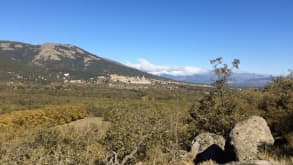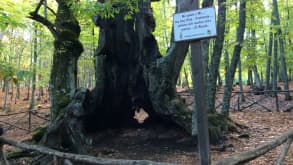Popular Topics
Trip Report
Spanish Castles & Mountains Around Madrid Spain
10 days in October exploring the most beautiful villages, Spanish castles, and the Guadarrama Mountains, Spain, all just 45 minutes from Madrid.
EuropeSpain10 days / October 2019
Highs & Lows
Touring the Royal Monastery in San Lorenzo de El Escorial. Mushroom hunting in Valsaín.
Having no room for dessert after the home-cooked Spanish tortilla and craft beers in Manzanares el Real!
Itinerary Overview
Our itinerary starts just 45 minutes north of Madrid in Manzanares el Real before zig-zagging through some of the most scenic villages in the Guadarrama Mountains. Highlights of this region include Spanish castles, palaces, royal monasteries, unique nature experiences, and traditional cuisine from central Spain.
Since the Guadarrama Mountains are literally a stone's throw from the Madrid city center, you can turn any of these excursions into an easy day trip. If you're traveling on a tight budget or don't want to hassle with a rental car, most of the villages can be accessed by public transport.
Along with the crisp autumn colors and brisker temperatures, visiting the Guadarrama Mountains in October allowed us to plan activities that are only possible during the fall months. Even though Lucie and I live nearby, this trip turned out to be a picture-perfect [and romantic] getaway from the daily grind.
Our only regret wasn't not having enough time to visit Buitrago de Loyoza, Rascafría, and Pedrezuela...but I guess that means we'll have to come back again soon!

Manzanares el Real Spanish Castles & La Pedriza National Park


 1+
1+At just under an hour from the Madrid city center, it's hard to believe Manzanares el Real still manages to go relatively unnoticed by tourists.
History, cultural heritage, and pristine nature...this village is one of the region's hidden gems and serves as a gateway for excursions in the Guadarrama Mountains.
The Castle of Manzanares el Real
With roots stretching back to the 15th century, this magnificent fortress once served as the royal palace for the Mendoza family. Today, it remains one of the best-preserved castles in the Community of Madrid.
As we strolled around its gothic-style walls, we felt like kings once did hundreds of years ago. Adding to its magic, the towering granite peaks in La Pedriza serve as a picturesque backdrop.
Entrance to the grounds is free of charge and gives you access to a handful of excellent photo ops (best in the afternoon). You can also explore inside the castle walls for a small fee...well worth it if you can splurge a few euros!
Hiking in La Pedriza
When you arrive in Manzanares el Real, you'll understand why I say it's hard to ignore the presence of La Pedriza. This national park is characterized by its massive granite formations that can be identified on clear days from the Madrid city center. Here, you'll find enough hiking to keep you busy for a lifetime.
On our first hike of the trip, we braved up the 2-hour approach to El Yelmo (The Helmet). Although the trail was quite steep, there were plenty of places to stop for a rest and snap photos of mountain goats scrambling across the boulders. We quickly forgot about our tired legs once we reached the base of El Yelmo...talk about spectacular views!
If you're looking for a flatter option, we definitely recommend hiking to La Charca Verde (The Green Pond). This natural swimming hole gets its name from the vibrant green colors that reflect off the granite basin. Good luck convincing your friends that your photos aren't photoshopped!
Artisan craft festival
Every first weekend of the month, the town square plays home to a market for local artisans. In addition to handmade crafts, you can also find a selection of regional products such as honey, cured meats, soaps, craft beer, and cheeses...just make sure not to wander between booths on an empty stomach like we did!
For us, the highlight of the entire market was the bird keeper and his owls. Getting to interact closely with such incredible creatures is an experience we'll never forget!

San Lorenzo de El Escorial Royal Monastery & Phillip II's Chair



From Manzanares el Real, our trip heads west to the quaint village of San Lorenzo de El Escorial. A short 45-minute car ride takes you through the foothills of the Sierra Guadarrama mountains, with plenty of places to stop for photos.
If you have extra time, consider spending a few hours at the Valle de los Caídos (Valley of the Fallen). This national historic monument commemorates the soldiers who lost their lives during the Spanish Civil War — an impressive feat of modern engineering that took almost 20 years to complete!
Royal Monastery of San Lorenzo de El Escorial
The highlight of any visit to San Lorenza de El Escorial is sure to be the Royal Monastery (Real Monasterio)...and for good reason!
Over the years, this massive complex has served as a royal palace, church, museum, university, library, hospital, and more. At one point in time, both the Spanish monarchy and leaders of the Roman Catholic Church found their home underneath its roof!
While it's free to walk around the grounds, we definitely recommend splurging for the tour (tickets are €12/person). We spent about two hours wandering through the halls and even learned that the majority of Spanish kings have been buried here for the last five centuries.
It's no wonder the Royal Monastery was declared a UNESCO World Heritage site!
Hiking up to La Silla de Felipe II
It is said that King Felipe II ordered workers to carve this throne-like chair out of large granite formations so he could observe the construction of the Royal Monastery during the 16th century.
Since the weather was great, we decided to start our hike after touring the Royal Monastery. To our surprise, we arrived in just under an hour...an easy 30 minutes from the village to the parking lot, then another 30 minutes gently uphill to the chair!
With views of the entire valley, we felt like Spanish royalty sitting in King Felipe II's Chair. On clear days, you can even see La Pedriza on the horizon!

Real Sitio de San Ildefonso Royal Palace & Mushroom Hunting



After leaving San Lorenzo de El Escorial, our GPS takes us an hour north to the charming village of Real Sitio de San Ildefonso. You can get here by highway, but we recommend taking the scenic route across the Navacerrada mountain pass.
Royal Palace of San Ildefonso
This village is built entirely around the 18th-century palace that once served as a summer residence for Spanish royalty. Apart from the incredible Baroque-style architecture, the gardens are what give the Royal Palace its special feel.
Just outside the palace, you'll find cobblestone streets lined with boutique coffee shops and gourmet restaurants — the perfect place for a café con leche!
Mushroom hunting in the magical forests of Valsaín
In olden times, the forests of Valsaín were the chosen hunting grounds for Spanish kings. But this shouldn't be a surprise speaking they are less than 10 minutes from the Royal Palace!
While the forests are beautiful year round, it's during the fall months when the magic truly happens. Not only do the brisker temperatures bring out brilliant autumn colors, but they also signal the arrival of mushroom season.
We were able to hook up with a local guide who took us into the forests and showed us the ropes. Apparently, Valsaín is one of the best areas in the Guadarrama Mountains to find edible mushrooms ('setas' in Spanish). Words do no justice for dinner cooked with fresh mushrooms that we picked with our own hands!

El Tiemblo The 'El Castañar' Chestnut Forest


Our last stop of the trip takes us to the province of Ávila on the southwest end of the Guadarrama Mountains. From El Real Sitio de San Ildefonso, it's an easy two-hour drive to the village of El Tiemblo.
El Castañar de El Tiemblo
Visiting the chestnut forest of El Castañar is one of the most famous fall activities in central Spain...and for good reason! In addition to the leaves changing colors, it's during the autumn months when the chestnut trees begin to bear their fruit.
Since El Castañar is a protected nature reserve, you aren't allowed to pick chestnuts without a special permit. Luckily, we didn't have much trouble finding a shop to purchase a bag in El Tiemblo. There's nothing like snacking on warm chestnuts on a chilly October afternoon!
While you're exploring El Castañar, make sure you hike up to see the 600-year-old chestnut tree known locally as El Abuelo. Pictures don't do its size any justice...its trunk is almost 60 feet in circumference!
Q & A
What would you have changed?
We regret not planning an extra day or two to visit Buitrago de Lozoya — a small village surrounded by fortress walls constructed by the Arabs and the Lozoya River. At least we have a good reason to go back!Restaurant recommendations?
In Manzanares el Real, you'll find a variety of excellent restaurants at affordable prices. Don't be fooled by the worn-down appearance of Kiosko El Peñote (near the El Tranco parking lot) — this small, family-owned bar serves up home-cooked food made to order. Their Spanish tortilla is not to be missed! Down in the village, Restaurante La Jara has excellent burgers, and PizzaReal knows how to whip up great pizzas. Also, be sure to keep an eye out for the 'La Pedriza' craft beers...brewed locally using water from nearby rivers! Over in San Lorenzo de El Escorial, La Taberna del Corcho serves fantastic rice dishes (paellas) as well as food typical from the Sierra de Guadarrama. Plus, their wine menu is long enough to last a lifetime!Tips you would give a friend?
While many people believe it's 'always mild & sunny in Spain,' this is not always the case for Madrid. Summer temps can sore to unbearable levels (+100°F), and winter temps can easily drop below freezing...not to mention the wind! For the best weather, plan your visit for early autumn or late spring. This should give you the best chance to avoid rainy periods and enjoy 't-shirt & jeans' temperatures.Packing tips?
A good pair of boots or shoes for hiking is a must for this itinerary. You should also keep in mind that temperatures tend to be 8-10°F cooler in the mountain villages than in the Madrid city center...maybe more if you decided to go for a hike near water or into higher elevation!Transportation Tips?
When it comes to visiting small villages, renting a car will always give you the greatest amount of freedom. If you aren't 100% comfortable with a stick shift, make sure to ask the rental agency for an automatic car. Some of the roads around these villages can be steep and narrow! Alternatively, you can reach many of the villages by public transportation coming from the Madrid city center.
Lodging
We recommend Hostel La Pedriza for their friendly service and inexpensive accommodations. Other options include camping, Airbnb, or making this a day trip from Madrid.
Hotels in San Lorenzo de El Escorial typically run on the expensive side, but you can usually find an affordable Airbnb. Turning this into a day trip from Madrid is also an option!
There are a variety of rural cottages offering individual rooms and entire apartments. Alternatively, this could be a day trip from either Madrid or Segovia.
This village is the furthest from Madrid, so we recommend staying in a rural cottage. The area is home to a plethora of options at all price levels!



